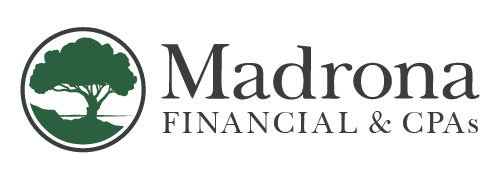Frequently Asked Questions
Everyone Is Different, And That’s How It Should Be.
Here are the most common questions we receive. If you don’t see the answer to your question, feel free to call us at 844-MADRONA or email us at plan@madronaplanning.com.
Got questions about landlord exit strategies, 1031 exchanges, or DSTs? Click Here.
Who Do You Work With?
We work with those who want guidance in growing their wealth while maintaining their preferred quality of life. That includes pre-retirement planning, retirement planning, tax planning, real estate exit planning, succession planning, and more.
Those who work with us must have at least $250,000 of investable assets, not including the value of their primary residence.
What Makes Madrona Different?
Our advisors at Madrona Financial are held to the fiduciary standard (required by law to act in your best interest). Also, through our sister firm, we have in-house CPAs ready for advanced tax planning.
At Madrona Financial, you'll get the best of both worlds (Advisors + CPAs)
How Much Does The Rooted Wealth Analysis Cost?
The Rooted Wealth Analysis is a complimentary analysis (no cost to you). We offer it at no cost in hopes that as many people will request it and see where they stand so that they can take a proactive approach in managing their wealth.
How Does Madrona Make Money?
Madrona Financial is an investment advisory firm, meaning we typically get paid a percentage of the assets we manage. The fee will vary based on each clients’ situation but often ranges between 0.8% and 1.25% (or less for DST investments) and can be automatically withdrawn from your investment account on a quarterly basis.
When appropriate for a client, we may sell insurance products (annuities, life insurance, long-term care, etc.) through our affiliate, Madrona Insurance. In this case, we do not collect an ongoing management fee but we do get paid a commission by the insurance agency.
Our CPA fees may be charged hourly al la carte by our sister firm, Bauer Evans, for additional tax planning.
What Do I Need For The First Meeting?
Before every first meeting, we ask that you fill out to the best of your abilities the Rooted Wealth Analysis questions. The more information we have, the better we can serve you. If you also have tax returns, statements, and other financial documents available, it will only help us help you more.
How Much Does The Rooted Wealth Plan Cost To Create?
We do not charge to put together a Rooted Wealth Plan. It is a complimentary service that we provide.
What Is The Bundle Of Services?
Our clients receive access to a suite of services, including pre-retirement planning, retirement planning, Social Security optimization, real estate planning, tax planning, and more.
Every plan we put together covers the 7 roots that sustain wealth.
I Like My Current Advisor... Why Would I Switch?
Financial advisors are generally very likable! Unfortunately, when it comes to personal finance, likability doesn’t get you very far. Very few financial service firms can provide the level of expertise and service that we deliver at Madrona Financial.
If Madrona Financial might be a good fit for your personal finance needs, we welcome you to contact us and request a free financial review. The free financial review provides an opportunity for prospective clients to get a feel for what it’s like to work with us. Come in for your free meeting and ask us as many questions as you want.
How Do I Hire Madrona Financial?
Thank you for putting your trust in us. The first step is to request a Rooted Wealth Analysis. This allows both parties to understand what’s working and what needs to be addressed. Once completed, both parties will be able to determine if they want to proceed and create a Rooted Wealth Plan, or not.
Once both parties decide it makes sense to move forward, you’ll be directed to move your assets to our custodian, typically Fidelity Institutional. You do not need to call your old financial advisor to complete this step.
Once you review and sign some paperwork, we will review and finalize a recommended course of action that is specific to your situation and implement the plan once your assets have transferred.
Over the years, we have seen too many examples of good people who have made poor financial decisions because they lacked the expertise necessary to make educated, thoughtful decisions about their money. While we cannot promise great stock market returns every year, we can promise that we will deliver our best efforts to help you achieve your financial goals.
For Landlords Looking For An Exit, Here Are Our Frequently Asked Questions About DSTs.
If you don’t see the answer to your question, feel free to call us at 844-MADRONA or email us at plan@madronaplanning.com.
How Are DSTs Different From REIT’s?
REITs are actively managed blind pool funds operated by a board of directors. DSTs are tangible assets.
What is the expected rate of return for a DST?
3% to 5% is the target annual return rate (cash flow).
Does it differ if you have a residential sale? What about raw land?
No. 1031 Exchanges consider all investment property like-kind.
Will I ever get a capital call?
No.
Does citizenship affect whether or not you can enter a DST?
It may affect an investor’s ability.
What would the worst-case scenario be in a DST?
The asset is foreclosed upon and investors lose their equity. This is no different for owner-operated real estate.
What are the requirements to enter a DST?
Investors must be accredited
Can I still enter a DST without a 1031 Exchange (no real estate)?
Cash investments are allowed. Approx. $25k
When does the DST sponsor sell the property?
5-10 years.
Can you sell part of your DST investment in an emergency?
In case of an emergency and with the sponsor’s approval, investors may be able to sell their investment.
Do you have to file a tax return in every state where your DST is located?
Technically, yes.
Why have I not heard of a DST before?
DSTs are complicated. They require an advisor to have both tax and real estate expertise. We employ both advisors and CPAs that are trained specifically on DSTs, which makes us different.
Does cash flow appreciate as time progresses?
In many cases, as rents increase so will cash flow
Does older scheduled depreciation roll into a new one?
Yes, the current basis and depreciation from the relinquished property roll over to the replacement property.
Have you seen a DST lose value?
Yes, real estate risk still applies.
What would happen in the event of a natural disaster?
Insurance is placed on all properties.
What is the management fee for investing in a DST?
Ranges from 1-4% of rents.
What needs to be done before I sell my property?
Speak with your CPA, advisor and hire a Qualified Intermediary to discuss your 1031 strategy.
What happens to the property debt owed when you invest into a DST?
Investors must replace their debt.
Do DSTs or 1031 exchanges work for international properties?
No, 1031 Exchanges are US for US exchanges.
What if the DSTs are owned within states that have income or estate tax?
This is viewed as a benefit. Consult your CPA.
When do you get a step-up in basis?
Depends on investors home state. For example, WA has a 100% upon first death, but Oregon is 50% upon first death.
7 Steps to a Successful Retirement
How to Confirm Your Retirement Is Designed to Support the Quality of Life You Want for 30+ Years
7 Essential Steps to Take Before You Retire
How to Prepare for a 30+ Year Retirement
Learn the Rules to Sustain Wealth
Think All You Need Is Income? Wrong!
How to Sustain Your Wealth, Even in a Crash
The Truth About Tax Planning
Discover What Lifestyle Planning Actually Is
All You Need Is a Good Portfolio, Right? WRONG!
Why Your Advisor May Not Be Enough
BONUS: Exclusive Access to the Growing You Wealth Newsletter

